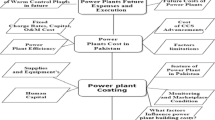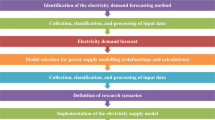Abstract
This study analyzes the options for meeting power demand in the Brazilianpower sector through the year 2015. Three policy cases are constructedto test economic and environmental policy measures against a baseline:advanced technologies scenario, environmental control scenario and carbon(C) elimination scenario. Least-cost modeling simulated these scenarios throughchanges in emissions fees and caps, costs for advanced technologies,demand side efficiency, and clean energy supplies. Results show that, in theabsence of alternative policies, new additions to Brazil's electric powersector will shift rapidly from hydroelectricity to combined-cycle natural gasplants. When the cost of environmental impacts are incorporated in theprice of power, the least-cost mix of electric power generation technologycould change in other ways. In all scenarios, energy efficiency andcogeneration play an important role in the least-cost power solution. Savingelectricity through increased efficiency offsets the needs for new supply andhas enormous potential in Brazil's industrial sector. Efficiency also reducesthe environmental burden associated with electricity production andtransmission, without compromising the quality of the services demandedby end users. Interesting enough, carbon dioxide (CO2) emissions will remainrelatively low under almost every conceivable scenario.
Similar content being viewed by others
References
Appleby, A.: 1996, 'Fuel cell technology: Status and future prospects', Energy 21(7/8), 521–653.
AEN/IEA: 1998, Projected Costs of Generating Electricity, Paris, France, OECD.
Bernstein, M., Hassel, J., Bromley, P., Lempert, R., Muñoz, J. and Robalino, D.: 1999, Developing Countries and Global Climate Change: Electric Power Options for Growth, technical report, Arlington, Virginia, Pew Center on Global Climate Change.
Carpentieri, E. and Larson, W.: 1993, 'Future bagasse-based power generation in northeast Brazil', Bagasse and Bioenergy 4(3), 149–173.
Carvalho, A.: 1995, 'High capacity factor wind energy systems', J. Solar Eng. 117, 137–143.
Cavalcanti, E. and de Brito, R.: 1999, 'Geração heliotérmica: uma nova opção de energia limpa para o Brasil', Anais do VIII Congresso Brasileiro de Energia, Rio de Janeiro, Brazil, pp. 1566–1575.
Chandler, W., Guo, Y., Logan, J., Shi, Y. and Zhou, D.: 1998, China's Electric Power Options: An Analysis of Economic and Environmental Costs, technical report, Arlington, Virginia, Pew Center on Global Climate Change.
Cortez, L.: 1997, Sistemas Energéticos - Tecnologias de Conversão Energética da Biomassa, Manaus, Brazil, EDUA/EFEI.
De Nascimento, M.: 1998, Fontes Alternativas de Energia em Sistemas Isolados: Uma Possível Solução para o Problema da CCC, Rio de Janeiro, Brazil, CEPEL.
De Souza, M., Walter A. and Faaij, A.: 1999, 'Viabilidade do uso de gás natural como combustível complementar em sistemas BIG-CC, em usinas de açÚcar e álcool', Anais do VIII Congresso Brasileiro de Energia, Rio de Janeiro, Brazil, pp. 1172–1180.
EIA: 1998, Natural Gas: Issues and Trends, Washington, DC, U.S. Department of Energy, Energy Information Administration.
EIA: 1999, International Energy Annual 1999, Washington, DC, U.S. Department of Energy, Energy Information Administration.
Eletrobrás: 1998a, Plano Decenal de Expansão - 1998-2007. Rio de Janeiro, Brazil, Eletrobrás.
Eletrobrás: 1998b, Estimativa do Potencial de Cogeração no Brasil. Rio de Janeiro, Brazil, Eletrobrás.
Eletrobrás: 1999, Sistema de Informações sobre Potencial Hidrelétrico - SISPOT. Rio de Janeiro, Brazil, Eletrobrás.
Externe: 1998, ExternE-Externalities of Energy Use: A Research Project of the European Commission.
Feitoza, S. Serra, E. and Nascimento, M.: 1999. 'Células Combustíveis, Etanol e Co-geração: Ideal para o Brasil?', Eletricidade Moderna (January), 124–131.
Ferreira, R.: 1993, 'Lavadores de gases', Revista Saneamento Ambiental 22, 12–17.
Gagnon, L. and Vate, J.F.: 1997, 'Greenhouse gas emissions fom hydropower: The state of research in 1996', Energy Policy 25(1), 7–14.
Geller, H., Jannuzzi, G.M., Schaeffer, R. and Tolmasquim, M.T.: 1998, 'The efficient use of electricity in Brazil: Progress and opportunities', Energy Policy 26(11), 859–872.
Goswami, D.: 1998. 'Solar thermal technology: Present status and ideas for the future', Energy Sources 20, 137–145.
Hamilton, K. and Giles, A.: 1996, 'Air pollution and green accounts', Energy Policy 24(7), 675–684.
Joshi, M. and Lee, M.: 1996, 'Integrated gasification combined cycle - A review of IGCC technology', Energy Sources 18, 537–586.
Ministério das Minas e Energia - MME.: 1999, Balanço Energético Nacional, Brasília, Brazil, MME.
Pimenta, J.: 1999, 'Células de combustível: Energia limpa para o desenvolvimento sustentável', Eletricidade Moderna, (April), 224–235.
Ribeiro, S.: 1995. Uso Energético dos Produtos de Cana-de-AçÚcar como Instrumento do Brasil em Negociações Internacionais para Redução de Emissão de Gases de Efeito Estufa, DSc. Thesis, Rio de Janeiro, Brazil, COPPE/UFRJ.
Rosa, L.P., Tolmasquim, M.T. and Pires, J.C.: 1998, A Reforma do Setor Elétrico no Brasil e no Mundo: Uma Visão Crítica, Rio de Janeiro, Brazil, Relume Dumará.
Rosa, L.P., Schaeffer, R. and dos Santos, M.A.: 1996, 'Emissões de metano e dióxido de carbono de hidrelétricas comparadas às de termelétricas equivalentes', Cadernos de Energia 9(1), 111–155.
Rosa, L.P. and Schaeffer, R.: 1995, 'Global warming potentials: The case of emissions from dams', Energy Policy 23(2), 149–158.
Rosa, L.P. and Schaeffer, R.: 2000, 'Carbon dioxide and hydroelectric reservoirs', Science, correspondence submitted.
Rosa, L.P. and Schechtman, R.: 1996, 'Avaliação de custos ambientais da geração termelétrica: Inserção de variáveis ambientais no planejamento da expansão do setor elétrico', Cadernos de Energia 9(2), 168–214.
Rosa, L.P., Tolmasquim, M. and Arouca, M.: 1998, 'Potential for reduction of alcohol production costs in Brazil', Energy 23(11), 987–995.
Schaeffer, R., Szklo, A. and Marques, J.: 1999, Metodologia de Elaboração de Cenários de Oferta de Energia Elétrica para o Brasil no Período 1995-2015, technical report, COPPE, Rio de Janeiro, Brazil, Federal Universtity of Rio de Janeiro.
Schaeffer, R., Logan, J., Szklo, A., Chandler W., and Marques, J.: 2000, Developing Countries & Global Climate Change: Electric Power Options in Brazil, technical report, Arlington, Virginia, Pew Center on Global Climate Change.
Schechtman, R., Szklo, A.S. and Sala, J.: 1998, Determinação das Emissões de Carbono Derivadas do Sistema Energético Brasileiro - Abordagem Bottom Up, technical report, MCT/COPPE - Projeto BRA/95/G31 - Enabling Brazil to Fulfill its Commitments to the UN Framework Convention on Climate, Rio de Janeiro, Brazil, COPPE, Federal University of Rio de Janeiro.
Tolmasquim, M., Schaeffer, R., Szklo, A. and Tavares, M.: 1999, Impactos da Liberação da Importação de Derivados sobre a IndÚstria de Refino Nacional, technical report, ANP/COPPE, Rio de Janeiro, Brazil, Federal University of Rio de Janeiro.
Tolmasquim, M., Szklo, A. and Soares, J.: 1999, Avaliação dos Potenciais Técnico e Econômico e Identificação das Principais Barreiras à Implantação da Cogeração no País, technical report, PROCEL/COPPE, Rio de Janeiro, Brazil, Federal University of Rio de Janeiro.
Turdera, M., Guerra, S. and de Almeida, R.: 1997, 'Alocação da renda gasífera: Uma análise do gasoduto Brasil-Bolívia', Revista Brasileira de Energia 6(2), 57–75.
Tyner, G., Costanza, R. and Fowler, R.: 1988, 'The net-energy yield of nuclear power', Energy 13(1), 73–81.
Vate, J.F.: 1997, 'Comparison of energy sources in terms of their full energy chain emission factors of greenhouse gases', Energy Policy 25(1), 1–6.
U.S. DOE: (1997), Cost and Performance of Clean Coal Technology in Brazil - Draft Final Report, Washington, DC, United States Department of Energy.
Zylbersztajn, D. Coelho, S.: 1993, 'Colheita mecânica de cana e economicidade da cogeração', Anais do VI Congresso Brasileiro de Energia, Rio de Janeiro, Brazil, pp. 33–47.
Rights and permissions
About this article
Cite this article
Schaeffer, R., Logan, J., Szklo, A.S. et al. Brazil's Electric Power Choices and Their Corresponding Carbon Emissions Implications. Mitigation and Adaptation Strategies for Global Change 6, 47–69 (2001). https://doi.org/10.1023/A:1011365526243
Issue Date:
DOI: https://doi.org/10.1023/A:1011365526243




